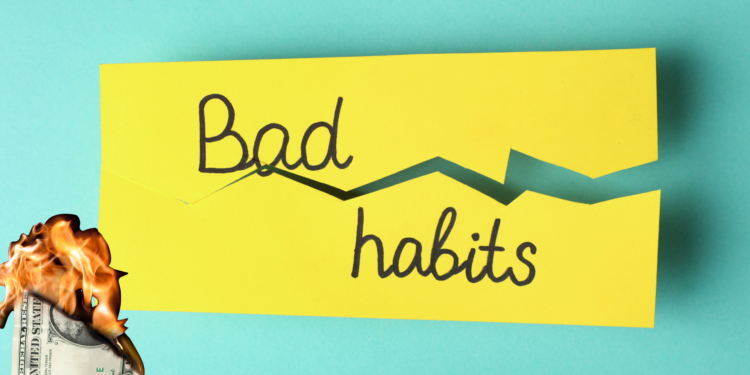Your financial future and ability to build wealth depend on your money habits. Money habits refer to the routine practices of navigating your financial life. People typically develop money habits during childhood through financial socialization.
The habits continue to grow through adolescence and affect financial decisions and behaviors in adulthood. Poor money habits can make lead to financial instability over time. This post examines 11 money habits you need to address for future financial freedom.
Not Having A Budget
Failing to create a budget is one of the money mistakes that will make you poor. A budget sets out your income and expenditure for a specific period of time. Not having a budget puts you at risk of impulse buying and losing track of your money. You need to properly budget your income. Budgeting helps you to cut unnecessary expenses and increase your savings for future investments.
Spending More Than You Make
Spending more than you are making can lead to financial failure. It is extremely difficult to save money when you are overspending. You can’t spend money you don’t have. Any moment your spending exceeds your earnings, you begin to accumulate much debt. Overspending also means you can’t save for retirement or emergency funds.
Having A Single Source Of Income
Relying on a single source of income is risky. In the Holy Scripture, we are instructed to invest in seven or eight ventures. “Invest in seven ventures, yes, in eight; you do not know what disaster may come upon the land.” – Ecclesiastes 11:2.
Having your job as your sole source of income can expose you to risks when disaster strikes. You may lose your job if the employer closes down or trims down the workforce. Natural disasters such as droughts may leave you without a source of livelihood if you rely solely on farming. It is prudent to look for side hustles to create multiple streams of income.
Saving Money In A Current Account
It is not suitable to save money in a current account. Current accounts are designed to provide you access to your funds frequently. You can make withdrawals and payments through this account. However, easy access to the funds may trigger unplanned uses of your savings.
Another drawback of the current account is that you don’t get any interest on your money. Saving accounts are ideal choices to put your savings as they earn interest while discouraging impulsive expenses.
Taking Loans For Ongoing Expenses
Some people resort to taking out loans as a means of support when their expenses exceed their salary. While this may be a good idea in the short term, it may become problematic when it develops into a habit. If you frequently take loans for ongoing expenses, you become lazy. The habits limit your motivation to find other creative ways to grow your income.
Debt Addiction/Use of Loans to Finance Your Lifestyle
Debt addiction involves the use of borrowed funds to finance a lifestyle that you cannot afford. It is a bad idea to take loans to finance vacations, leisure activities, and compulsive shopping. Using loaned money to finance gambling, parties, alcohol consumption, and illicit drug use is a huge impediment to financial success.
Seeking To Impress Others
Trying to impress other people can lead to financial problems. Many people are falling into the temptation of impressing others under the influence of social media. The drive to impress others forces people to look for new (expensive) apartments in leafy suburbs, purchase high-end vehicles on loans, buy expensive clothes, get expensive smartphones, and acquire expensive household items (TVs, fridges, cookware, furniture, etc.).
This adverse habit may serve your ego and give you an edge when competing with others. However, living a life with the desire to compete with others may leave you heavily indebted and crumbling in poverty.
Failing To Build An Emergency Fund
Failure to have an emergency fund can make you poor. The emergency fund is designed to cover financial emergencies and unplanned expenses. Examples of financial emergencies include unexpected medical bills, car repairs, loss of income, and damaged cell phones.
The lockdown during the COVID-19 pandemic demonstrated the need to have a solid emergency fund. People closed their businesses, while others lost their jobs. Setting aside some money may provide you with some financial security during such situations. The emergency fund must cover your expenses for several months – at least three months.
Taking High-Risk Loans
A high-risk loan can be beneficial in desperate times. However, such loans come with substantial fees and extremely high-interest rates. The consequences of defaulting on high-risk loans can be severe. In many cases, high-risk loans are unsecured. This means you don’t have to put up any collateral.
Other high-risk in Kenya include title loans and logbook loans. Because the car or property provides the collateral, the lenders don’t care about your credit score. You could be paying interest that exceeds the original loans. Also, you can easily lose your car or property if you default. Most high-risk loans are offered through instant loan apps.
Failure To Invest
Failure to invest is one of the classical habits that will crumble your journey to build wealth. Some people tend to hoard their money and grow their wealth by saving. You will never build wealth by putting your money in your savings account.
If you desire to build wealth, you must start investing now. But you need to consult an expert before making any investment. The expert guides you on the appropriate time and places to invest for good returns.
Impulse Buying
Impulse buying can hinder your financial goals and quickly empty your bank accounts. Impulse buying is the behavior of making spontaneous or unplanned purchases. The habit is the fastest route to poverty, especially when you spend more than you’re making. Avoid any flawed justification of unplanned purchases and strictly adhere to your budget.




